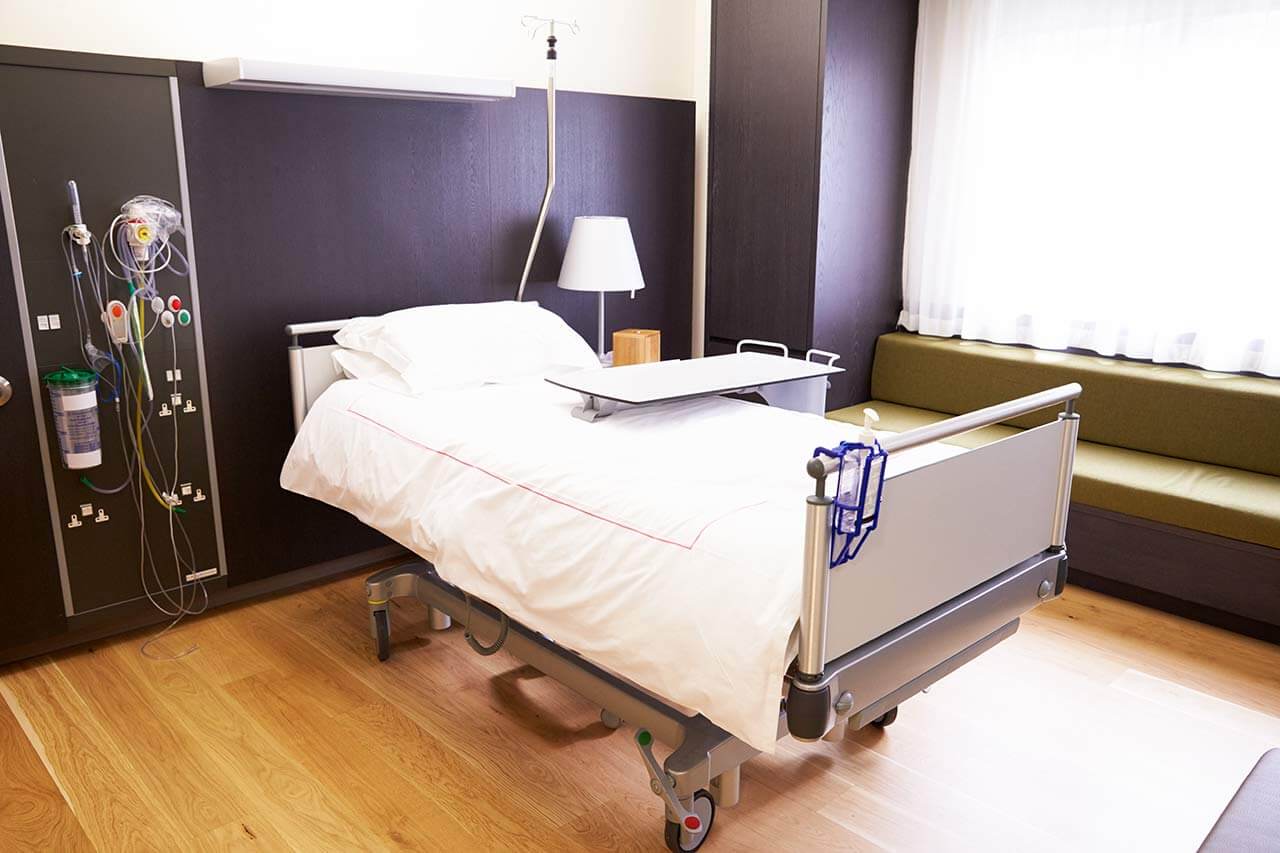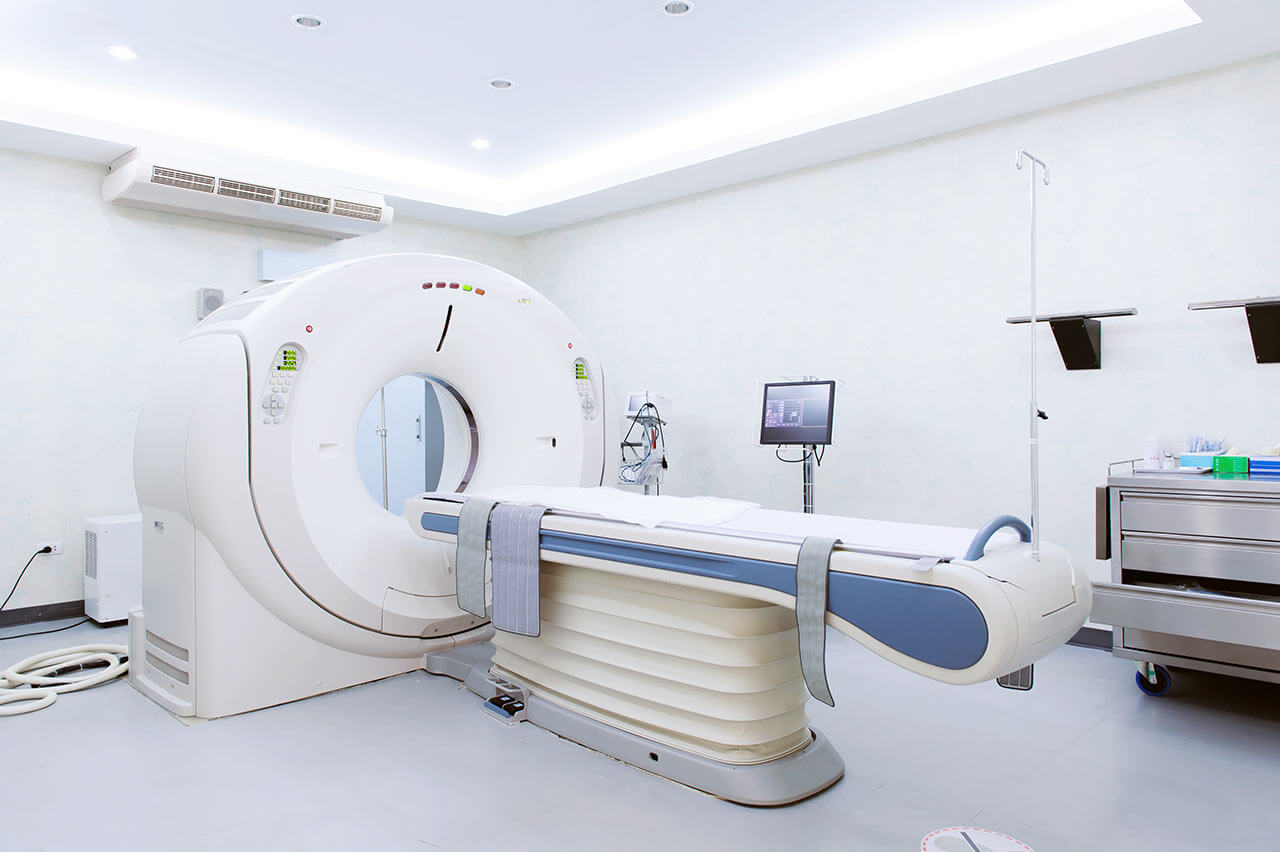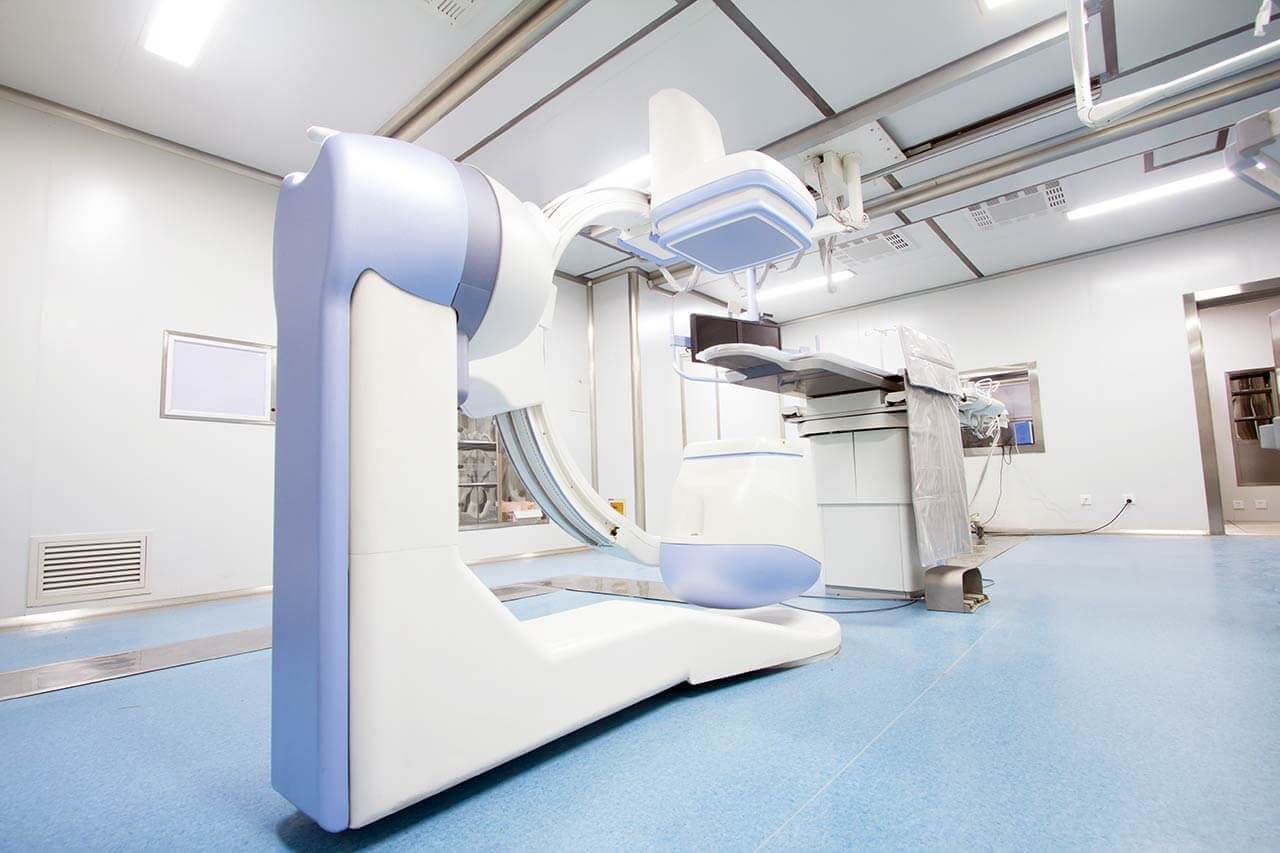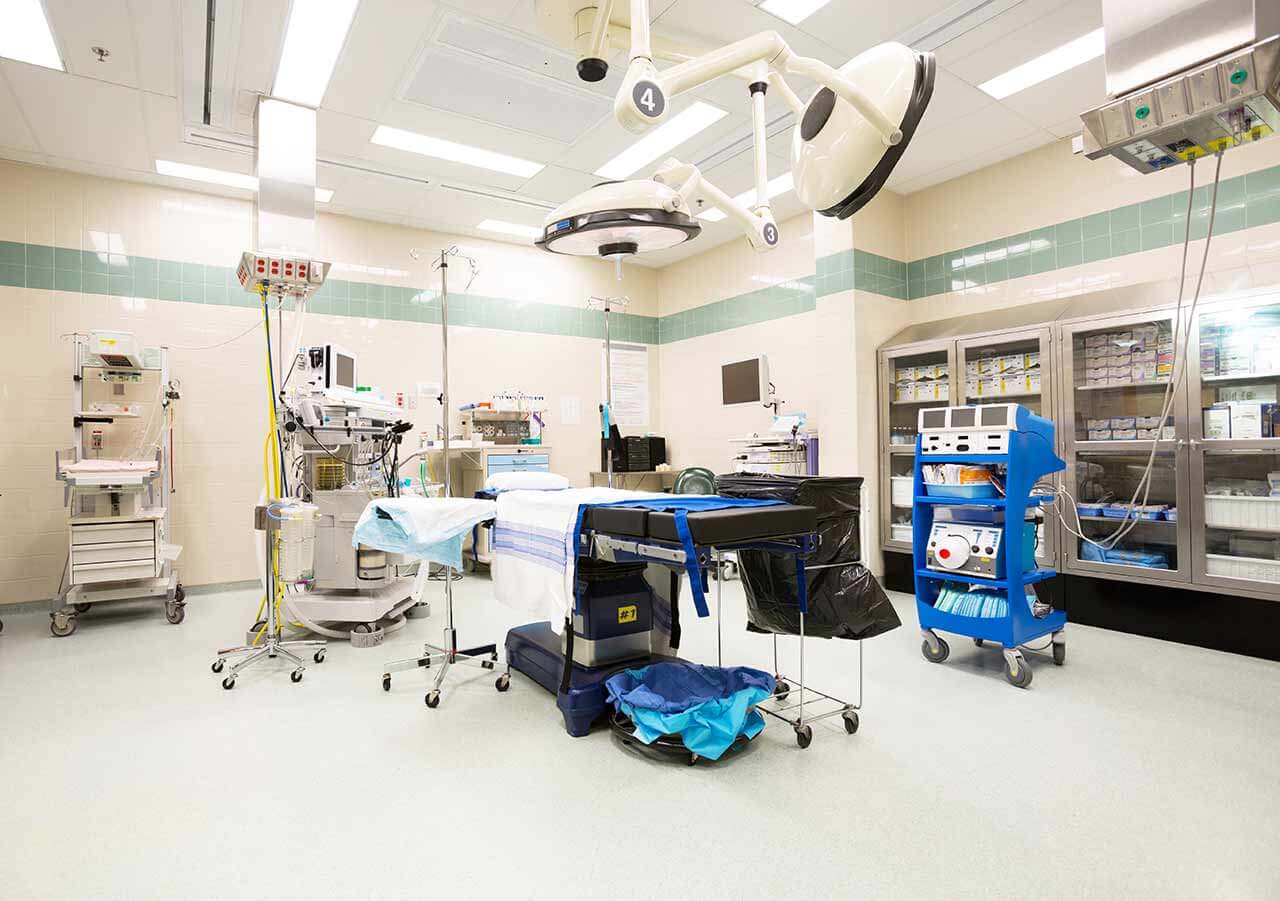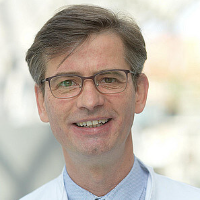
The program includes:
- Initial presentation in the clinic
- clinical history taking
- review of medical records
- physical examination
- laboratory tests:
- complete blood count
- general urine analysis
- biochemical analysis of blood
- TSH-basal, fT3, fT4
- tumor markers
- inflammation indicators
- indicators of blood coagulation
- CT / MRI of the abdomen and retroperitoneum
- abdominal and retroperitoneal ultrasound scan
- full curse of radiotherapy
- nursing services
- consultations of related specialists
- explanation of individual treatment plan
How program is carried out
During the first visit, the doctor will conduct a clinical examination and go through the results of previous laboratory tests and instrumental examinations. After that, you will undergo an additional examination, including complete blood count, laboratory assessment of liver and kidney function. Based on the received results, the physician will conduct radiotherapy planning with the help of CT or MRI, make the permanent tattoo marks on the skin and conduct CT simulation in order to assess the accuracy of the rays and the radiation dose. If necessary, related medical specialists will be involved in the elaboration of a treatment regimen (tumor board).
Radiation therapy is carried out as the day hospital procedure, without mandatory admission to the hospital. At each visit, the physician will assess your general condition and the marks on the skin. After that, you will be placed in a shielded radiation therapy room, on a special table.
Each radiation therapy session lasts less than half an hour (including preparation). All this time, doctors and nurses are monitoring your condition, you can communicate with them through a loudspeaker. The procedure is completely painless. Depending on the planned course of treatment, you will visit the hospital from 1 to 3-5 times a week.
After the completion of the radiation therapy course, you will undergo control examinations aimed at assessing your condition and efficacy of treatment. After that you will receive the medical report with detailed recommendations regarding further follow-up and treatment. In the future, you will be able to have a distant consultation with your attending physician and schedule the next course of treatment, if necessary.
Required documents
- Medical records
- MRI/CT scan (not older than 3 months)
- Biopsy results (if available)
Service
You may also book:
 BookingHealth Price from:
BookingHealth Price from:
About the department
According to the Focus magazine, the Department of Radiation Therapy at the Charite University Hospital Berlin is ranked among the best medical facilities in Germany in its area of specialization!
The department performs all types of modern radiation therapy for the treatment of benign and malignant tumors: intensity-modulated radiation therapy, volumetric-modulated arc therapy, stereotactic radiation therapy, image-guided radiation therapy, brachytherapy, and other types of radiation. The medical facility has the latest equipment – 8 powerful linear accelerators, 2 brachytherapy units, X-ray systems, devices for intraoperative radiation therapy and proton therapy, and advanced systems for individual radiation planning. The department offers the innovative CyberKnife radiosurgical system, which provides high-precision treatment of tumors of various locations. It should be noted that there are only 11 CyberKnife Treatment Centers in Germany, and the center of the Department of Radiation Therapy at the Charite Hospital is recognized as the best among them. The department is also one of the pioneers in Germany in the field of adaptive radiation therapy. In most cases, patients receive treatment on an outpatient basis, without hospitalization. Because of the importance of comprehensive medical care, the radiation therapists work hand in hand with specialists from the Charite Comprehensive Cancer Treatment Center, the National Center for Cancer Diseases Berlin (NCT), and the German Cancer Consortium (DKTK). The Head Physician of the department is Prof. Dr. med. Daniel Zips.
In the clinical practice of the department, the advanced CyberKnife radiosurgery system, which is available only in the leading medical centers of the world, is successfully used. The main advantage of CyberKnife therapy is that the device allows focusing high doses of radiation with millimeter precision. This guarantees effective destruction of cancer cells, while neighboring healthy tissues are not damaged. The technical features of the CyberKnife system allow it to target small and large tumors of almost any location, including tumors of the brain, head and neck, spine, chest, lungs, liver, pancreas, kidneys, and prostate, making it a unique tool in the fight against cancer. As a rule, one radiation session is enough for the patient – in rare cases, the radiation dose is divided into 3-5 procedures. Radiation with the CyberKnife system is carried out on an outpatient basis, so the patient can return to their usual lifestyle in the shortest possible time. In addition, the therapeutic procedure is absolutely painless and safe, therefore it is an excellent alternative to open surgery and traditional fractionated radiation therapy.
The department also offers stereotactic radiation therapy – a high-precision radiation method that involves targeted exposure of the tumor to very large doses of ionizing radiation with optimal protection of nearby normal tissues. Stereotactic radiation therapy is performed in the medical facility on a modern TrueBeam STx linear accelerator manufactured by Varian and using the CyberKnife system manufactured by Accuray. This type of radiation therapy is an effective method for treating brain metastases, acoustic neuroma, meningiomas, glomus tumors, craniopharyngiomas, and recurrent malignant gliomas. The equipment for stereotaxy allows for the irradiation of tumors up to 10 cm in size. A special mask is used for positioning and immobilizing the patient during the radiation procedure. The key advantages of stereotactic radiation therapy are its high precision and minimal side effects.
The Department of Radiation Therapy at the Charite University Hospital Berlin became one of the first in Germany where patients can undergo innovative adaptive radiation therapy. Such radiation is performed using a special Ethos linear accelerator manufactured by Varian, which was put into operation in October 2023. Adaptive radiation therapy is an innovative treatment method that takes into account the individual characteristics of the patient: before each radiation session, specialists from the department analyze in detail changes in the tumor, its position relative to surrounding tissues and organs. This makes it possible to direct ionizing radiation to the target area as accurately as possible without damaging healthy tissues. The Ethos system has a built-in modern high-precision imaging system and artificial intelligence technologies, which makes it unique among existing linear accelerators. The method is especially effective in the treatment of prostate cancer, bladder cancer, rectal cancer, and anal canal cancer.
The medical team of the department also applies modern radiation methods, such as image-guided radiation therapy (IGRT), intensity-modulated radiation therapy (IMRT), volumetric-modulated arc therapy (VMAT), intraoperative radiation therapy, brachytherapy, and others. All methods of radiation therapy are highly effective, allowing the radiation dose to be focused as accurately as possible on the pathological focus without damaging healthy tissues. During treatment, the department's doctors strictly adhere to current clinical protocols and radiation protection standards, which minimizes complications and risks for the patient.
The range of medical services provided by the department includes:
- CyberKnife radiation
- Brain diseases
- Brain metastases
- Acoustic neuroma
- Meningioma
- Arteriovenous malformations
- Trigeminal neuralgia
- Pituitary adenoma
- Spine and spinal cord diseases
- Spine metastases
- Meningiomas
- Neuromas
- Lung diseases
- Lung cancer (early stages)
- Lung metastases
- Prostate diseases
- Localized prostate cancer
- Localized recurrence of prostate cancer
- Single prostate cancer metastases to lymph nodes and bones
- Kidney and adrenal diseases
- Kidney and adrenal metastases
- Selected patients with renal cell carcinoma
- Liver diseases
- Liver metastases
- Individual cases of hepatocellular carcinoma
- Pancreatic diseases
- Selected patients with pancreatic cancer
- Head and neck tumors
- Skull base tumors
- Recurrent ENT tumors
- Brain diseases
- Stereotactic radiation therapy
- Brain metastases
- Acoustic neuroma
- Meningiomas
- Glomus tumors
- Craniopharyngiomas
- Recurrent malignant gliomas
- Adaptive radiation therapy
- Prostate cancer
- Bladder cancer
- Rectal cancer
- Anal canal cancer
- Brachytherapy
- Cervical cancer
- Endometrial cancer
- Intraoperative radiation therapy
- Image-guided radiation therapy (IGRT)
- Intensity-modulated radiation therapy (IMRT)
- Volumetric-modulated arc therapy (VMAT)
- Visual-guided radiation therapy
- Total body irradiation (before bone marrow transplantation)
- Total skin irradiation for the treatment of cutaneous T-cell lymphoma
- Proton therapy
- Choroidal melanoma
- Ciliary body melanoma
- Iris melanoma
- Conjunctival melanoma
- Eye hemangioma
- Retinoblastoma
- X-ray therapy
- Arthrosis
- Heel spur
- Tennis elbow
- Cancer treatment methods that are performed in combination with radiation therapy
- Chemotherapy
- Hyperthermia
- Palliative care
- Other medical services
About hospital
According to the reputable Focus magazine, the Charite University Hospital Berlin ranks 1st among the best healthcare facilities in Germany!
The hospital is one of the largest and leading university medical complexes in Europe, and also consistently holds leading positions in the international medical arena. The Charite operates on the basis of the Faculty of Medicine of the Free University of Berlin and the Humboldt University of Berlin. Patients are offered modern diagnostics and treatment with the very latest methods, many of which were developed by professors and scientists of the medical complex. More than half of all German Nobel Prize winners in medicine and physiology, such as Emil von Behring, Robert Koch, and Paul Ehrlich, studied and worked at the Charite University Hospital Berlin. The medical complex includes more than 100 specialized departments and institutes, which helps to ensure that patients receive care in all existing medical specialties. The hospital has exceptional experience in treating complex clinical cases.
Each year, the hospital treats more than 137,800 inpatients and more than 787,700 outpatients. The hospital has a bed capacity of 3,293 beds. A huge medical team consisting of 5,670 scientists and doctors and more than 6,000 nurses work for the benefit of the patients. The main task of all specialists of the medical facility is to restore the patient's health or save his life in critical cases. The hospital has a friendly atmosphere where every patient feels care, respect and empathy.
The Charite University Hospital Berlin is generously funded by the German government, which is why it offers patients the latest generation of excellent equipment and comfortable infrastructure. The Charite medical complex is equipped with da Vinci robotic surgery systems, laser technologies, equipment for endovascular catheter-based interventions, neuronavigation devices, intraoperative monitoring systems, equipment for proton therapy available only in the most advanced medical centers in the world, and many other technologies. All these resources, combined with the experience and professional skills of the hospital's doctors, are the key to providing the most effective and safe treatment in accordance with the highest international medical standards.
The hospital is recognized with a huge number of quality certificates, including DIN EN ISO 9001:2015, certificates from the German Cancer Society (DKG), the German Society for General and Visceral Surgery (DGAV), the German Society for Thoracic Surgery (DGT), the German Hernia Society (DHG), and the ERAS Society.
The Charite University Hospital Berlin is a benchmark in the European healthcare system. Patients therefore receive impeccable medical service, quality care, and personalized service that puts the patient and their individual needs first.
Photo: (с) depositphotos
Accommodation in hospital
Patients rooms
The patients of the Charite University Hospital Berlin live in comfortable rooms made of modern design. Each room is equipped with an ensuite bathroom with a toilet and a shower. The standard room furnishing includes an automatically adjustable bed, a bedside table, a wardrobe for storing clothes, a table and chairs for receiving visitors, and a TV. If desired, Wi-Fi access can be provided. The hospital also offers enhanced-comfort rooms.
Meals and Menus
The patient and his accompanying person have a daily choice of three menus. If for any reason, you do not like the food, you will be offered an individual menu. Please inform the medical staff about your dietary preferences before the treatment.
Further details
Standard rooms include:
Religion
Religious services are available upon request.
Accompanying person
During the inpatient program, an accompanying person may stay with you in a patient room or at the hotel of your choice.
Hotel
During the outpatient program, you can live at a hotel of your choice. Managers will help you to choose the most suitable options.
The hospital offers a full range of laboratory tests (general, hormonal, tests for infections, antibodies, tumor markers, etc.), genetic tests, various modifications of ultrasound scans, CT scans, MRI and PET / CT, angiography, myelography, biopsy and other examinations. Treatment with medications, endoscopic and robotic operations, stereotaxic interventions is carried out here, modern types of radiation therapy are also used. The hospital offers patients all the necessary therapeutic techniques.
- Proton therapy
- CyberKnife treatment
- Hyperthermic intraperitoneal chemotherapy (HIPEC)
- PSMA therapy with Lutetium-177
- Joint replacement in adults and children
These are oncological diseases, benign neoplasms of the brain and spinal cord, heart valve defects, diabetes mellitus and its complications, joint diseases and other pathologies.
- Neurosurgery
- Oncology
- Plastic and reconstructive surgery
- Interventional radiology
- Proton therapy (Proton Therapy Center BerlinProtonen)
The medical team includes more than 4,225 highly qualified scientists and doctors.
